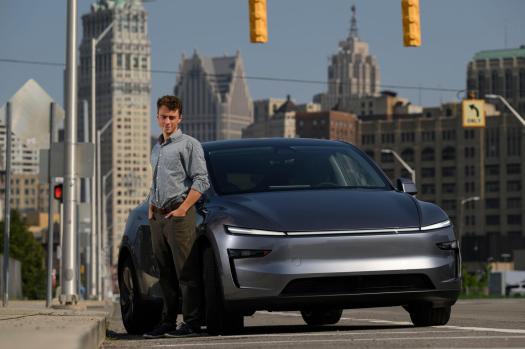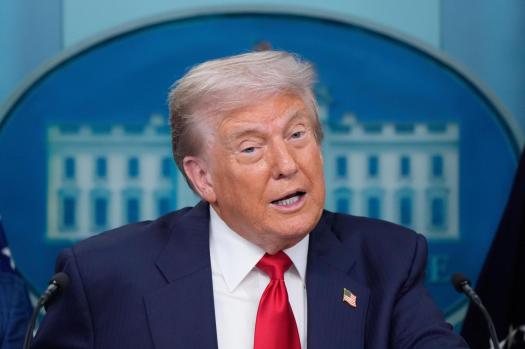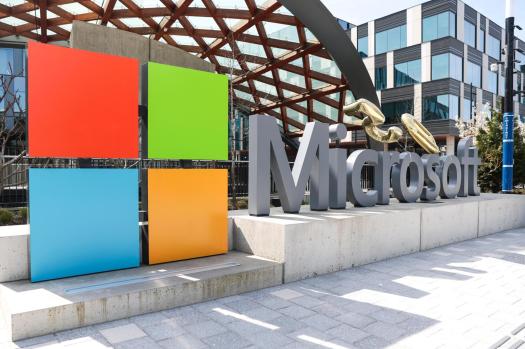By The Detroit News’ Summer Ballentine
For months, Michael MacGillivray had been planning to switch from his gas-powered Ford Bronco to an electric car.
In his capacity as a certified public accountant, he monitored the congressional discussion surrounding President Donald Trump’s extensive tax and budget plans, which would eliminate $7,500 tax incentives for certain first-time electric vehicle purchasers. MacGillivray realized he had to take action after Trump signed the measure into law on July 4.
As he drove his new Tesla Model Y back after a road trip to Toronto, MacGillivray told The Detroit News, “I was leaning toward the EV anyway, but the tax credit pushed me over the edge.”
The 25-year-old from Ann Arbor is one of many people, referred to by analysts as “fence sitters,” who are purchasing electric vehicles in the final weeks before the tax credit expires on September 30. And in preparation for at least a brief decline in interest rates when the credits expire, automakers are using the short-term boost to clear inventory.
Compared to July 2024, Hyundai’s electrified sales increased by 50%. Sales of Toyota and Lexus electric vehicles increased 6.7% to 90,426. General Motors Co. reported that July was its best-ever month for its electric fleet, selling over 19,000 EVs—a 115% increase over July 2024.
According to Walter Tutak, dealer trade inventory manager at the Champion-Hargreaves Chevrolet dealership in Royal Oak, everyone wants them immediately before the tax advantages expire.
According to an email from Jessika Laudermilk, assistant vice president of U.S. sales at Honda, the company’s record July sales of electric vehicles were partly caused by purchasers pulling ahead of the industry as a result of the EV tax credits’ imminent expiration. In July, the carmaker’s Prologue EV sold 6,318 units, an increase of 82.7% from the previous year.
According to Laudermilk, we anticipate that this will continue in August and September.
Tesla Inc. did not provide data in response to a Detroit News question, and automakers are not obligated to record monthly sales.
One of the many automakers giving significant incentives on both EVs and plug-in hybrids, along with prominent wording on its brand sites attempting to entice customers to take action, is Stellantis NV, which similarly failed to provide July sales data: While you can, get your EV incentive! In an advertisement for its all-electric Wagoneer S, Jeep states on its website.
According to Lauren Fix, CEO of the research business Automotive Aspects, brands are using incentives in excess, which benefits consumers.
Former technology analyst and auto reviewer Anton Wahlman stated that there will be an inventory clearing event in the coming weeks.
Manufacturers will use their own incentives to offset the loss of the EV tax credit in order to maintain pricing stability, according to Sam Fiorani, an industry analyst at AutoForecast Solutions: Although price reductions are doubtful, lease offers or customer refunds may be available.
In order to meet the low level of consumer interest in EVs, analysts anticipate that manufacturers will further reduce production, particularly as Trump seeks to repeal federal emissions regulations that forced businesses to produce those models regardless of consumer demand.
Dealers are unable to order multiple versions of Stellantis’ electrified goods as the company has already begun to reduce manufacturing.
“We are working to ensure our production plan is in line with consumer demand in accordance with our retail priorities and the plans shared with our dealer network,” the business said in a statement.
They will only sell some of them if they can turn a profit when the industry as a whole reduces production over a number of years, Wahlman stated.
Therefore, he continued, there would be a lot fewer models and they will cost a lot more.
“EVs are going to be phased out of the market in the midterm,” Fiorani continued. They are currently supported by federal incentives and emissions rules, but once those two factors disappear, manufacturers will have little reason to introduce a new model to a market already oversaturated with EVs.
Related Articles
-
Yandle: Is America producing more with less?
-
New York City allows robotaxi company to test autonomous vehicles in Manhattan and Brooklyn
-
Trump trumpets deal giving US a 10% stake in downtrodden Intel
-
Ticker: Trump says he ll keep extending TikTok shutdown deadline; Cracker Barrel unveils a new logo
-
Home Showcase: Amesbury condo offers unconventional living
While several are diverting their investments toward hybrids and gas-powered, lucrative trucks and SUVs, automakers say they are still dedicated to EVs in the long run.
According to Toyota Motor North America spokesperson Derrick, Toyota’s dedication to vehicle electrification is simply one significant component of its endeavor to assist the globe in creating a zero-carbon future. In an email, Justin Brown stated. That commitment is unwavering despite the current changes in the sector, such as those involving EV tax incentives, and we currently have no intentions to change our strategy.
According to Laudermilk, Honda sees electrification as a journey rather than a race.
According to Laudermilk, we are still committed to growing our electrified range by using our flexible manufacturing to create ICE, hybrid-electric, and battery-electric vehicles on the same production lines in order to satisfy consumer demands.
Despite investing in Orion Assembly in Michigan, Tonawanda Propulsion in New York, and Toledo Propulsion Systems in Ohio to strengthen its gas-powered fleet, GM leaders have stated that the corporation will continue to seek EV advancements.
Last year, Ford Motor Company decided to start producing gas-powered Super Duty pickups at its Oakville Assembly Complex in Ontario instead of a three-row, battery-powered SUV. Additionally, the Dearborn carmaker announced this month that Ford would invest $2 billion to produce a midsize electric pickup at Louisville Assembly, but it also postponed the release of its next-generation electric van and electric full-size truck.
As Trump and a GOP-controlled Congress cut the environmental and fuel economy requirements that had initially caused the engine’s slow demise, Stellantis revealed plans this summer to reinstate 5.7-liter Hemi V-8 engines in Jeep SUVs and Ram light-duty pickups.
According to Fiorani, manufacturers disregard electrification at their own risk, even though the regulatory climate for gas engines is more favorable.
According to him, a savvy manufacturer will recognize this as the future’s trend and make an investment. A short-term manufacturer will disregard the future of electric vehicles and return to producing just internal combustion engines.
DetroitNews.com, 2025. You can visit DetroitNews.com. Tribune Content Agency, LLC is the distributor.












